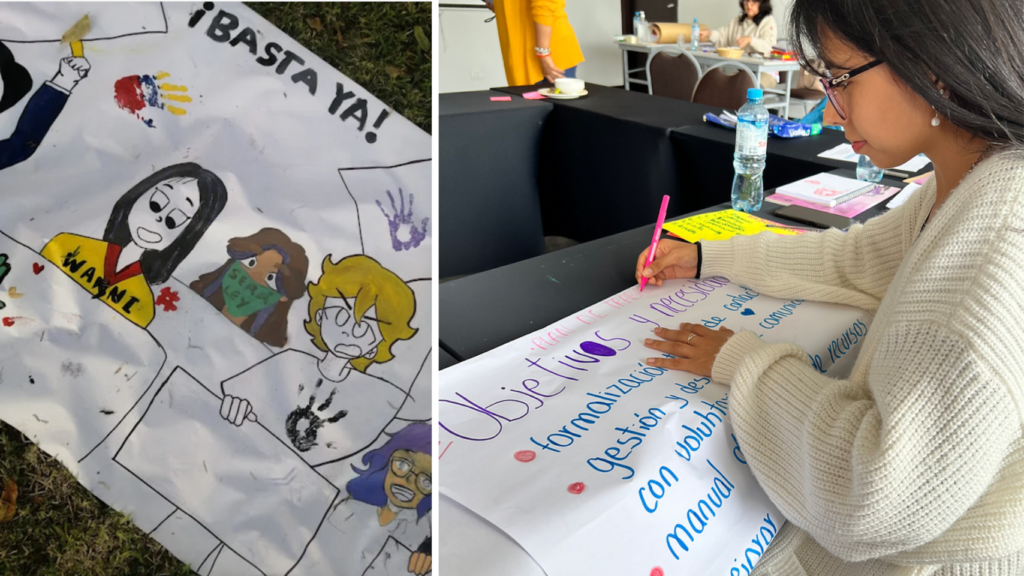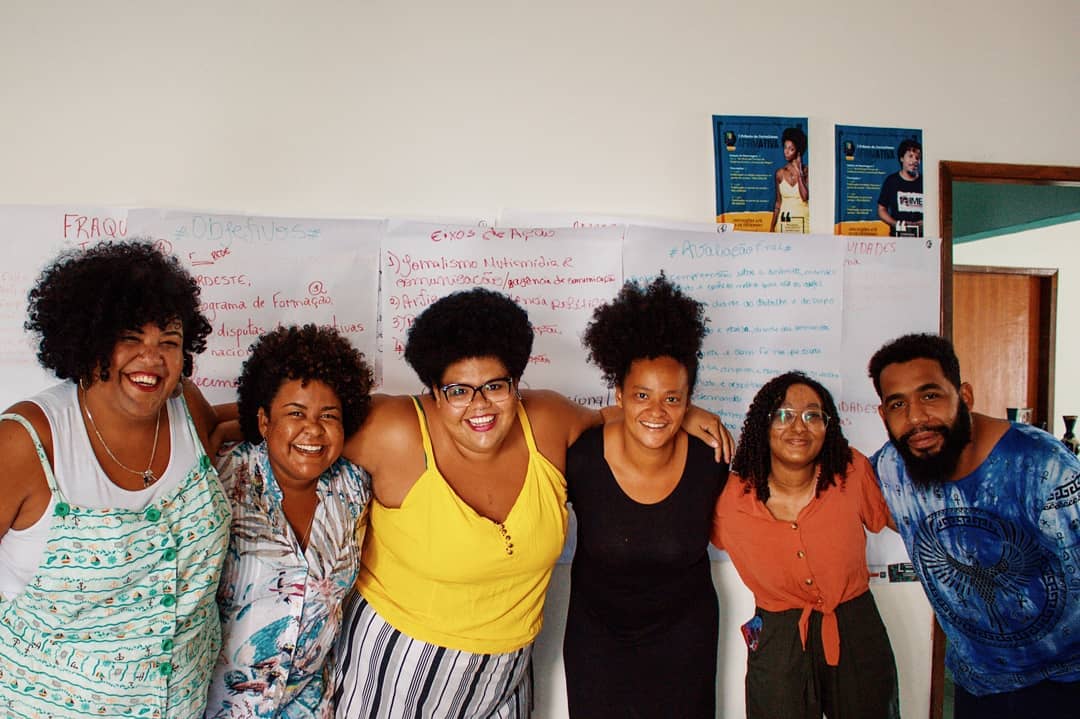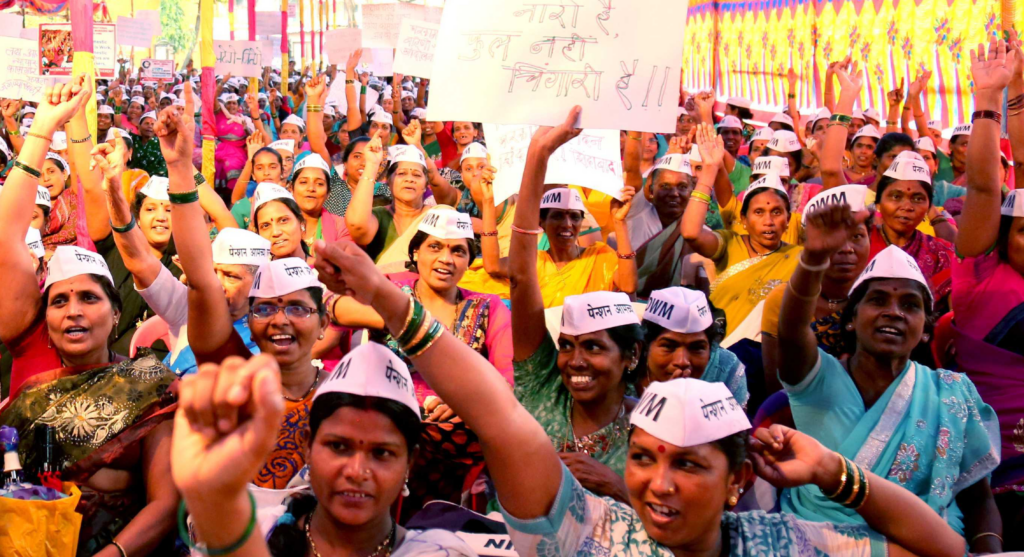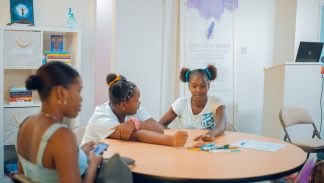Intersectional Feminist Leadership and Collective Work Across Borders
No one achieves gender justice alone. From empowering youth in Peru and transforming media narratives in Brazil to reimagining reproductive health services in Haiti and domestic worker’s rights in India, feminist collectives are playing a crucial role in shaping a more just and equitable world. Today, we shine a light on stories from partners across Latin America and Asia that are driving transformative change through intersectional approaches and community-centered solutions.
Building a Future Free from Violence in Peru
Latin America has some of the world’s highest rates of femicide: on average, more than nine women are killed a day. Between 2020 and 2021, over 8,549 women and girls had been listed as missing. Most of them are girls under the age of 20. In Peru, young people face profound challenges related to state repression, political setbacks, and systemic violence. Lucera, an anti-racist youth collective, is making strides to change this.
Lucera’s approach includes digital advocacy, creating and disseminating publications on racial and gender justice, and hosting educational and cultural events to understand youth experiences and discuss structural inequalities. Global Fund for Women’s support has been instrumental in helping them expand their reach, with actions ranging from educating young people on identifying abusive relationships and reporting cases of violence to caring for their sexual and reproductive health.
“Lucera was born from the need to highlight the experiences of young people (including our own) with discrimination and racism, as we identified a lack of spaces to address these issues from a youth perspective. Our struggle for equality and non-discrimination involves considering the multiple violences and their impact, always defending the rights of children and youth.” —Sara Cutipa, Lucera, Peru

Left: Peruvian and Venezuelan youth activists shared anti-racist activism experiences through arts. | Right: Sara Cutipa at Global Fund for Women's Movement Partners Convening in Peru.
Advancing Racial Justice Through Communication in Brazil
Since its founding in 2014, Revista Afirmativa has been at the forefront of challenging traditional media narratives that perpetuate racial and gender stereotypes in Brazil.
“Our ultimate goal is a world where patriarchal racism and all forms of oppression are dismantled, and where communication and journalism serve as instruments of racial and gender justice. We seek to create a space where the voices of Black people are not only heard but valued and respected, contributing to the construction of a more just, equitable, and inclusive society.” - Alane Reis, Revista Afirmativa

Recently, Revista Afirmativa produced a mini-documentary featuring Fran Cardoso, who used her experience with sexual violence to advocate for healing and support. The piece shares stories of Black women who reported experiences of sexual violence in large Brazilian cities and includes digital campaigns highlighting how communication can serve as a tool for healing, empowerment, and transformation.
Revista Afirmativa's efforts have increased visibility and understanding of racial and gender issues particularly in the Northeast region of Brazil, contributing to the coordination of events like the 2nd National March of Black Women in 2025 that will bring together over one million women, girls, and gender non-conforming people to march for racial justice.
Support Movements in Motion
Collective Approaches for Reproductive Justice in Haiti
Women in Haiti, part of Global Fund for Women’s network of grantee partners and advisors, stress the urgent need for collective solutions to achieve gender justice. A key concern is the disconnect between public health policies and the lived experiences of Haitian women.
“A lot of money is spent encouraging women to give birth in healthcare institutions, where they are often treated poorly. But no one questions why a woman with six children gives birth to her first child in a healthcare institution and the next five births at home. There is an essential element: the cultural aspect. This aspect, which is often overlooked, is a latent African heritage. For a woman who gives birth at home, childbirth is a social event accompanied collectively. People sing and dance to welcome the new life. This cultural aspect needs to be broadly integrated into public reproductive health policy” –– Tania Pierre-Charles, Global Fund for Women’s advisor.
Tania is a doctor and public health expert who has been working in Haiti for over 25 years. She highlights the crisis of funding and support facing Haitian organizations, a situation that has worsened since the 2010 earthquake.
Advocating for Domestic Workers' Rights in India
Geeta Menon, Joint Secretary of the Domestic Workers Union and consultant to Global Fund for Women, is at the forefront of advocating for women's rights in India. She works to address the intersections of caste, class, and gender, focusing particularly on the nearly 50 million domestic workers who are often exploited and lack formal recognition.
Despite the contribution of domestic workers to the country, they face significant challenges including lack of social security, arbitrary pay decisions, and abuse. Most domestic workers in India make less than $150 a month; and 74% of them do not have access to medical care. In Karnataka, the Minimum Wage Act has been in place since 2004, but its implementation has been inconsistent, leading to unequal wage practices. Geeta’s organization, Stree Jagruti Samiti, advocates for reforms to ensure fair wages and improve working conditions.
“One notable public case is that of a 17-year-old trafficked from Jharkhand to Bangalore, who faced severe abuse as a live-in domestic worker. Her rescue in 2014 led to landmark guidelines on forced labor trafficking issued by the High Court. The world we are building is towards change and freedom. This can only be achieved if every worker is recognized and valued,” Geeta Menon emphasizes.




